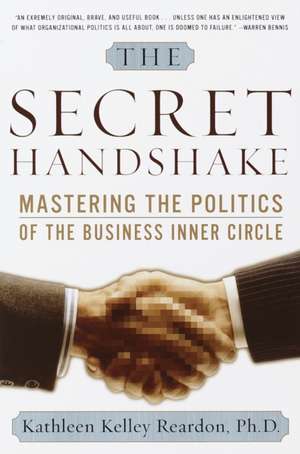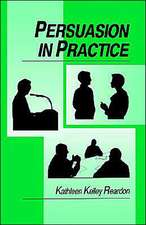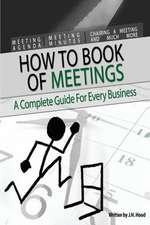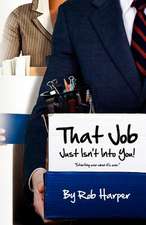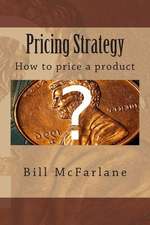The Secret Handshake: Mastering the Politics of the Business Inner Circle
Autor Kathleen Kelley Reardonen Limba Engleză Paperback – 31 dec 2001
Based on hundreds of candid interviews with executives at Fortune 500 companies who have achieved their goals and joined the inner circle, The Secret Handshake lays bare the unstated conventions that govern and shape corporate hierarchies. Taking readers inside boardrooms to learn firsthand how the top decision-makers view and assess the employees under them, it offers invaluable advice on such career-building tactics and skills as getting noticed, networking, persuading others, knowing which battles to fight, and mastering the art of the quid pro quo. For all those who aspire to be part of the decision-making body of their organization, The Secret Handshake is the ultimate intelligence report on whom to trust and whom to watch out for, how to manage the inevitable conflicts that will arise, and how to read between the corporate lines.
Preț: 107.68 lei
Nou
Puncte Express: 162
Preț estimativ în valută:
20.61€ • 22.38$ • 17.31£
20.61€ • 22.38$ • 17.31£
Carte disponibilă
Livrare economică 02-16 aprilie
Preluare comenzi: 021 569.72.76
Specificații
ISBN-13: 9780385495288
ISBN-10: 0385495285
Pagini: 272
Dimensiuni: 141 x 213 x 15 mm
Greutate: 0.25 kg
Editura: Broadway Business
ISBN-10: 0385495285
Pagini: 272
Dimensiuni: 141 x 213 x 15 mm
Greutate: 0.25 kg
Editura: Broadway Business
Notă biografică
KATHLEEN REARDON, Ph.D., is a professor of management at the Marshall School of Business at USC, the author of several acclaimed business books, and a highly regarded consultant who has worked with Toyota, Xerox, AT&T, and other leading corporations. She lives in Palos Verdes, California.
Extras
1
The Parameters of Organizational Power and Politics
There are two good reasons why the most coveted prize of business is called "the secret handshake." The first is that most people believe the political savvy necessary to break down barriers to the inner circles of organizations is inaccessible to all but a very few. That explains why there's a dearth of useful information devoted to the topic. Even organization experts consider politics an enigmatic puzzle. The second reason is that the path to the acquisition of this prize is purposely kept ambiguous by many of those who have successfully traversed it. They share sparingly the whereabouts and characteristics of the mazes, obstacles, and dangers that must be overcome in its pursuit. Some even deny that there is a path. After all, if just anyone could achieve the secret handshake, there would be no value in having attained it. It's an exclusive club, and certain conditions must be met for membership--certain hurdles overcome. Many of these hurdles have nothing to do with technical competence.
While the path to acquiring the secret handshake varies across organizations, both the existing research and the practical experiences of the many people I interviewed for this book indicate that political savvy is a prerequisite, more so even than job competence. This is especially true at higher levels of organizations where the signals are ever more ambiguous.
The prized executive offices are scarce, so competition is fierce. Yet at the loftier levels a high degree of professionalism is required. It's important for everyone to appear as though they are above pettiness and petulance. Consequently, political warfare at this level is subliminal and more often comprised of hidden minefields and stealth bombers than hand-to-hand combat. As the stakes get higher, the battle gets rougher, even if you can't see any weapons.
To the successful executive in a competitive organization, day-to-day life is politics. There is no doubt that a high level of field-based competence is needed to get ahead. But choose any two competent people, and the one who has political savvy, agility in the use of power, and the ability to influence others will go further.
Politics in the common vernacular refers to what other people do to get their way; as such it has negative connotations. Politics in organizations involves going outside the usual, formally sanctioned channels, something nearly every successful manager has done at one time or another. The real political moves are the ones not written down anywhere. Simply put, politics is an illegitimate means of getting things done.
So much of life is politics, especially at work. How should you approach a difficult situation? When should you take forceful action to stand up for yourself? How can you predict and prepare for others' reactions? Should you or shouldn't you fight a battle? If you do, how will you identify your allies and enemies? All these questions are part of daily life at work. As Caroline Nahas, managing director, Southern California, at Korn-Ferry International, sees it, there are two choices with regard to politics: "Either sit in the stands or get in the game and be a player." Yet Nahas doesn't see politics as necessarily--or even largely--negative: "To be politically astute, you need to read where the trend lines are, be ahead of the game, and focus on areas that you think will be important." There's nothing underhanded about this aspect of politics. In fact, it's constructive for the individual and the organization. Not all politics is so benign, however.
It didn't take Steve Harcourt, senior executive at a leading sports products company, long to learn this. As he describes it, he thought he'd been hired "to get all the money possible--to make a huge profit for the company." What he learned instead was that the CEO wanted increased profits but not at any cost. When Harcourt insulted one of the CEO's favored guys by suggesting that he do a few things differently, the response was not positive. Harcourt was edged out for a while. The CEO never said anything directly to him, but he got the message. He now believes, "If you ignore politics and make someone above you look bad, you're going to have a short career." So Harcourt's rule of thumb is to ask himself, "Can anything good come out of this?" That has gotten him the label of "political animal" at times, but as he sees it, politics is reality. You have to know when to speak up and when not to. Another Harcourt axiom: Don't tell the boss who doesn't want all the profits you could get for him that he isn't getting them. As Harcourt sees it, you have to know the primary goals and shape what you do to fit them.
Since political tactics aren't overtly sanctioned, they give rise to games that people play to build power bases, defeat rivals, and promote in-group members over those in the out-group. When such tactics work, over time they become embedded in the culture of the organization. At that point, few important things get accomplished in the absence of their application. Worse still, having gotten so used to playing games without having to think about how to do so, few if any of the people playing them are capable of articulating how they work. They can play them, but they can't explain how or why. They're like political robots irreversibly hardwired.
My primary aim in this book is to pull together the information gleaned from hundreds of interviews and probing discussions I've had with CEOs, senior managers, and high achievers in many fields during twenty years of business consulting, to shed light on how politics in organizations works. Moreover, I want to demonstrate how you can use political moves to gain admission to the inner circle of your organization--in short, to learn the secret handshake.
Politics and the Power Equation
While political strategies often operate in the service of wealth, they operate more often in the service of power--a resource for getting things done even in the face of resistance. The interesting thing about power is that it is often both a means to get ahead and the reward for getting there.
People who have valuable expertise, who control important resources or information, and those in positions of great authority not only can make things happen much more easily than those without power but also are in a position to increase their power and retain it. In order to win, the person engaging in politics need not always be the most powerful of those playing, but power does provide an advantage. It enables people to get things done even when others stand in opposition. Where one person has less formal power than others involved but accomplishes an objective nonetheless, it's likely that he or she used politics.
Power is at the heart of politics and may indeed be the heart of politics. Although power has a negative connotation for many people, it doesn't for those who've achieved the secret handshake. Without power they would not have made it. Without politics their sources of power would have been severely curtailed.
The Reciprocal Relationship Between Power and Politics
Even the most celebrated CEOs may never be far from losing power. A sharp drop in earnings, negative articles in Fortune, Forbes, or the Wall Street Journal, or the loss of key employees can bring them down a few pegs or even cost them their jobs. Unless they own the business outright, those executives whose power is supposedly unquestioned are wise not to believe it.
Bill Owens, president of a fast-growing video distribution company, discovered this when he hired an employee named Sam to take on some of the demands of the business. What Owens liked about his new right-hand man was his ability to handle things that clogged Owens's in-box. It appeared that Owens had found himself someone who could even run the show in his absence. When some of his people began to tell him that the perfect new hire had flaws, he assumed they were jealous. "I like to give my people room to fail, so I didn't pay much attention at first. Then I heard that Sam had been telling my people, 'Don't bother Bill with anything. Everything goes through me.' Some of my people warned me that I was giving him too much power. They claimed that he'd begun to say, 'I speak for Bill.' I thought it was a harmless exaggeration. After all, he was getting work off my desk."
It wasn't until a year had passed that Owens began to notice that what he called "the tone" of the company was changing for the worse. But he continued to tell himself that there was no way that such a competent, friendly, flattering person as Sam could be the problem. The increased workload seemed a more likely reason for employee unrest. "Sam stroked people, especially me. But I've since learned that he penalized anyone who tried to go directly to me. While he was flattering me, he was controlling them. He started telling my people, 'Bill's a great guy, but he forgets things.' Then 'Bill's a great guy, but he gets angry easily.' He told customers that he'd be doing something different soon, hoping to lure them away and start his own business. First he took the decision power, and then little by little he undermined my credibility with my employees and customers."
Eventually, Owens recognized Sam's intentions. During a six-hour wait for a tow truck when his car broke down on the way home from a ski trip, Owens realized that the warnings of his more loyal employees had been well founded. When he returned to work, he ousted Sam and spent the next few years undoing the damage.
Owens's experience demonstrates that even very experienced managers can overlook destructive politics. It also demonstrates that it's never too late to learn to recognize and respond to abuses of politics and power. Political savvy is a skill, not a trait. No one is precluded from acquiring it. Yes, there are some people to whom political acumen seems to come more easily than to others, just as some people learn languages or higher mathematics with greater ease than others do. Owens had to learn the hard way. But he's more alert now. The crucial fact here is that political savvy is an achievable skill for recognizing when politics is operating and for using those politics to your advantage. And it is a skill prerequisite to attaining the coveted secret handshake. So our next step is to define how to acquire it.
2
Political Savvy
Being political at work garners two benefits that often outweigh the costs in terms of effort and difficulty. First, politics helps advance careers. To the extent that a person is achievement-oriented and works in an organization where politics flourishes, he or she will have to use politics to get ahead.
"I've had to become more politically sensitive as the company has gotten larger," a senior manager of a rags-to-riches-in-no-time-flat computer software company told me. "The people around here are getting so rich that they're even beginning to think they're competent. To get around them, I've had to be less direct, more strategic, and less up-front about my intentions."
The second benefit of knowing how politics works is self-defense. When politically inhibited people use politics, it's often more to protect themselves from others than to advance their own careers. Once the politically inhibited person becomes politically adept, regardless of the reason for doing so, he or she often finds that politics leads to rewards.
The Political Continuum
Whether politics is used to advance careers or for self-protection, the first step is discovering where you are on the political continuum, from the politically active on one end of the scale to the politically inhibited on the other end. Not only are the politically active comfortable with politics, they truly enjoy maneuvering around the rules to get things done. The politically inhibited, at the other end of the continuum, dislike political movers and shakers. They may play along to get along, as the saying goes, but they prefer not to do so.
The extent to which your position on the political continuum helps or hurts your career depends on the organizational culture in which you work. If an extremely politically active person works in an organization where politics is limited or discouraged, he or she is likely to be both unhappy and unwelcome. Intensely politically inhibited people who work in highly political organizations, divisions, or even offices can become equally unhappy and overstressed unless they find a protective mentor or a quiet niche in which to work.
Marcy Bergren Pine, a successful Los Angeles attorney, was politically inhibited early in her career. Nevertheless, Pine, who is now a partner in the prestigious law firm of Morrison and Foerster LLP, forged a path to success. Upon her graduation from Loyola she joined a leading law firm that, she freely admits, "needed a female attorney and I was it." This is where her conversion from being politically inhibited to politically active began. She came to appreciate the connections she could make in a high-profile law firm. In fact, as she soon learned, few things get done without connections.
As she reinvented aspects of herself in order to attain the rank of partner, Pine embarked on a campaign of impression management, not in order to be well liked, but in order to become respected and well connected. She changed her voice from "the social one I learned to use while being groomed for years to be a wife, to a lower-pitched, attorney-like voice. I stopped smiling so much and developed a little more of an edge, especially with aggressive businessmen and attorneys." Pine became an astute observer of the political landscape where she worked, and adjusted her actions to fit expectations. She set her sights on becoming partner and then proceeded to learn and do what it would take.
While sitting at a law firm dinner as a fifth-year associate with former secretaries of state and the interior William Rogers and William Clark, Pine realized that she had indeed arrived. "The most interesting thing," she said of the occasion, "is that I truly felt that I belonged there." The secret handshake had become hers.
For many people, politics is not just the ticket into the game but the means by which you come to decide which game is to be played. There is a time-honored view of success that says you're successful when the number of idiots under you is larger than the number over you. Alison May, COO at Esprit and former CFO of Patagonia, explains it this way: "I like to be the one ultimately making the call. I would much rather make a stupid decision and take the consequences than have to implement a stupid decision made by someone else. Therefore, I think I come across as someone confident, focused, and determined, because I am willing to accept the risks and negative consequences of being in a position of power."
The Parameters of Organizational Power and Politics
There are two good reasons why the most coveted prize of business is called "the secret handshake." The first is that most people believe the political savvy necessary to break down barriers to the inner circles of organizations is inaccessible to all but a very few. That explains why there's a dearth of useful information devoted to the topic. Even organization experts consider politics an enigmatic puzzle. The second reason is that the path to the acquisition of this prize is purposely kept ambiguous by many of those who have successfully traversed it. They share sparingly the whereabouts and characteristics of the mazes, obstacles, and dangers that must be overcome in its pursuit. Some even deny that there is a path. After all, if just anyone could achieve the secret handshake, there would be no value in having attained it. It's an exclusive club, and certain conditions must be met for membership--certain hurdles overcome. Many of these hurdles have nothing to do with technical competence.
While the path to acquiring the secret handshake varies across organizations, both the existing research and the practical experiences of the many people I interviewed for this book indicate that political savvy is a prerequisite, more so even than job competence. This is especially true at higher levels of organizations where the signals are ever more ambiguous.
The prized executive offices are scarce, so competition is fierce. Yet at the loftier levels a high degree of professionalism is required. It's important for everyone to appear as though they are above pettiness and petulance. Consequently, political warfare at this level is subliminal and more often comprised of hidden minefields and stealth bombers than hand-to-hand combat. As the stakes get higher, the battle gets rougher, even if you can't see any weapons.
To the successful executive in a competitive organization, day-to-day life is politics. There is no doubt that a high level of field-based competence is needed to get ahead. But choose any two competent people, and the one who has political savvy, agility in the use of power, and the ability to influence others will go further.
Politics in the common vernacular refers to what other people do to get their way; as such it has negative connotations. Politics in organizations involves going outside the usual, formally sanctioned channels, something nearly every successful manager has done at one time or another. The real political moves are the ones not written down anywhere. Simply put, politics is an illegitimate means of getting things done.
So much of life is politics, especially at work. How should you approach a difficult situation? When should you take forceful action to stand up for yourself? How can you predict and prepare for others' reactions? Should you or shouldn't you fight a battle? If you do, how will you identify your allies and enemies? All these questions are part of daily life at work. As Caroline Nahas, managing director, Southern California, at Korn-Ferry International, sees it, there are two choices with regard to politics: "Either sit in the stands or get in the game and be a player." Yet Nahas doesn't see politics as necessarily--or even largely--negative: "To be politically astute, you need to read where the trend lines are, be ahead of the game, and focus on areas that you think will be important." There's nothing underhanded about this aspect of politics. In fact, it's constructive for the individual and the organization. Not all politics is so benign, however.
It didn't take Steve Harcourt, senior executive at a leading sports products company, long to learn this. As he describes it, he thought he'd been hired "to get all the money possible--to make a huge profit for the company." What he learned instead was that the CEO wanted increased profits but not at any cost. When Harcourt insulted one of the CEO's favored guys by suggesting that he do a few things differently, the response was not positive. Harcourt was edged out for a while. The CEO never said anything directly to him, but he got the message. He now believes, "If you ignore politics and make someone above you look bad, you're going to have a short career." So Harcourt's rule of thumb is to ask himself, "Can anything good come out of this?" That has gotten him the label of "political animal" at times, but as he sees it, politics is reality. You have to know when to speak up and when not to. Another Harcourt axiom: Don't tell the boss who doesn't want all the profits you could get for him that he isn't getting them. As Harcourt sees it, you have to know the primary goals and shape what you do to fit them.
Since political tactics aren't overtly sanctioned, they give rise to games that people play to build power bases, defeat rivals, and promote in-group members over those in the out-group. When such tactics work, over time they become embedded in the culture of the organization. At that point, few important things get accomplished in the absence of their application. Worse still, having gotten so used to playing games without having to think about how to do so, few if any of the people playing them are capable of articulating how they work. They can play them, but they can't explain how or why. They're like political robots irreversibly hardwired.
My primary aim in this book is to pull together the information gleaned from hundreds of interviews and probing discussions I've had with CEOs, senior managers, and high achievers in many fields during twenty years of business consulting, to shed light on how politics in organizations works. Moreover, I want to demonstrate how you can use political moves to gain admission to the inner circle of your organization--in short, to learn the secret handshake.
Politics and the Power Equation
While political strategies often operate in the service of wealth, they operate more often in the service of power--a resource for getting things done even in the face of resistance. The interesting thing about power is that it is often both a means to get ahead and the reward for getting there.
People who have valuable expertise, who control important resources or information, and those in positions of great authority not only can make things happen much more easily than those without power but also are in a position to increase their power and retain it. In order to win, the person engaging in politics need not always be the most powerful of those playing, but power does provide an advantage. It enables people to get things done even when others stand in opposition. Where one person has less formal power than others involved but accomplishes an objective nonetheless, it's likely that he or she used politics.
Power is at the heart of politics and may indeed be the heart of politics. Although power has a negative connotation for many people, it doesn't for those who've achieved the secret handshake. Without power they would not have made it. Without politics their sources of power would have been severely curtailed.
The Reciprocal Relationship Between Power and Politics
Even the most celebrated CEOs may never be far from losing power. A sharp drop in earnings, negative articles in Fortune, Forbes, or the Wall Street Journal, or the loss of key employees can bring them down a few pegs or even cost them their jobs. Unless they own the business outright, those executives whose power is supposedly unquestioned are wise not to believe it.
Bill Owens, president of a fast-growing video distribution company, discovered this when he hired an employee named Sam to take on some of the demands of the business. What Owens liked about his new right-hand man was his ability to handle things that clogged Owens's in-box. It appeared that Owens had found himself someone who could even run the show in his absence. When some of his people began to tell him that the perfect new hire had flaws, he assumed they were jealous. "I like to give my people room to fail, so I didn't pay much attention at first. Then I heard that Sam had been telling my people, 'Don't bother Bill with anything. Everything goes through me.' Some of my people warned me that I was giving him too much power. They claimed that he'd begun to say, 'I speak for Bill.' I thought it was a harmless exaggeration. After all, he was getting work off my desk."
It wasn't until a year had passed that Owens began to notice that what he called "the tone" of the company was changing for the worse. But he continued to tell himself that there was no way that such a competent, friendly, flattering person as Sam could be the problem. The increased workload seemed a more likely reason for employee unrest. "Sam stroked people, especially me. But I've since learned that he penalized anyone who tried to go directly to me. While he was flattering me, he was controlling them. He started telling my people, 'Bill's a great guy, but he forgets things.' Then 'Bill's a great guy, but he gets angry easily.' He told customers that he'd be doing something different soon, hoping to lure them away and start his own business. First he took the decision power, and then little by little he undermined my credibility with my employees and customers."
Eventually, Owens recognized Sam's intentions. During a six-hour wait for a tow truck when his car broke down on the way home from a ski trip, Owens realized that the warnings of his more loyal employees had been well founded. When he returned to work, he ousted Sam and spent the next few years undoing the damage.
Owens's experience demonstrates that even very experienced managers can overlook destructive politics. It also demonstrates that it's never too late to learn to recognize and respond to abuses of politics and power. Political savvy is a skill, not a trait. No one is precluded from acquiring it. Yes, there are some people to whom political acumen seems to come more easily than to others, just as some people learn languages or higher mathematics with greater ease than others do. Owens had to learn the hard way. But he's more alert now. The crucial fact here is that political savvy is an achievable skill for recognizing when politics is operating and for using those politics to your advantage. And it is a skill prerequisite to attaining the coveted secret handshake. So our next step is to define how to acquire it.
2
Political Savvy
Being political at work garners two benefits that often outweigh the costs in terms of effort and difficulty. First, politics helps advance careers. To the extent that a person is achievement-oriented and works in an organization where politics flourishes, he or she will have to use politics to get ahead.
"I've had to become more politically sensitive as the company has gotten larger," a senior manager of a rags-to-riches-in-no-time-flat computer software company told me. "The people around here are getting so rich that they're even beginning to think they're competent. To get around them, I've had to be less direct, more strategic, and less up-front about my intentions."
The second benefit of knowing how politics works is self-defense. When politically inhibited people use politics, it's often more to protect themselves from others than to advance their own careers. Once the politically inhibited person becomes politically adept, regardless of the reason for doing so, he or she often finds that politics leads to rewards.
The Political Continuum
Whether politics is used to advance careers or for self-protection, the first step is discovering where you are on the political continuum, from the politically active on one end of the scale to the politically inhibited on the other end. Not only are the politically active comfortable with politics, they truly enjoy maneuvering around the rules to get things done. The politically inhibited, at the other end of the continuum, dislike political movers and shakers. They may play along to get along, as the saying goes, but they prefer not to do so.
The extent to which your position on the political continuum helps or hurts your career depends on the organizational culture in which you work. If an extremely politically active person works in an organization where politics is limited or discouraged, he or she is likely to be both unhappy and unwelcome. Intensely politically inhibited people who work in highly political organizations, divisions, or even offices can become equally unhappy and overstressed unless they find a protective mentor or a quiet niche in which to work.
Marcy Bergren Pine, a successful Los Angeles attorney, was politically inhibited early in her career. Nevertheless, Pine, who is now a partner in the prestigious law firm of Morrison and Foerster LLP, forged a path to success. Upon her graduation from Loyola she joined a leading law firm that, she freely admits, "needed a female attorney and I was it." This is where her conversion from being politically inhibited to politically active began. She came to appreciate the connections she could make in a high-profile law firm. In fact, as she soon learned, few things get done without connections.
As she reinvented aspects of herself in order to attain the rank of partner, Pine embarked on a campaign of impression management, not in order to be well liked, but in order to become respected and well connected. She changed her voice from "the social one I learned to use while being groomed for years to be a wife, to a lower-pitched, attorney-like voice. I stopped smiling so much and developed a little more of an edge, especially with aggressive businessmen and attorneys." Pine became an astute observer of the political landscape where she worked, and adjusted her actions to fit expectations. She set her sights on becoming partner and then proceeded to learn and do what it would take.
While sitting at a law firm dinner as a fifth-year associate with former secretaries of state and the interior William Rogers and William Clark, Pine realized that she had indeed arrived. "The most interesting thing," she said of the occasion, "is that I truly felt that I belonged there." The secret handshake had become hers.
For many people, politics is not just the ticket into the game but the means by which you come to decide which game is to be played. There is a time-honored view of success that says you're successful when the number of idiots under you is larger than the number over you. Alison May, COO at Esprit and former CFO of Patagonia, explains it this way: "I like to be the one ultimately making the call. I would much rather make a stupid decision and take the consequences than have to implement a stupid decision made by someone else. Therefore, I think I come across as someone confident, focused, and determined, because I am willing to accept the risks and negative consequences of being in a position of power."
Descriere
Now available in paperback, Reardon's critically acclaimed "The Secret Handshake" offers an insider's guide on how to win a place within a company's powerful inner circle.
